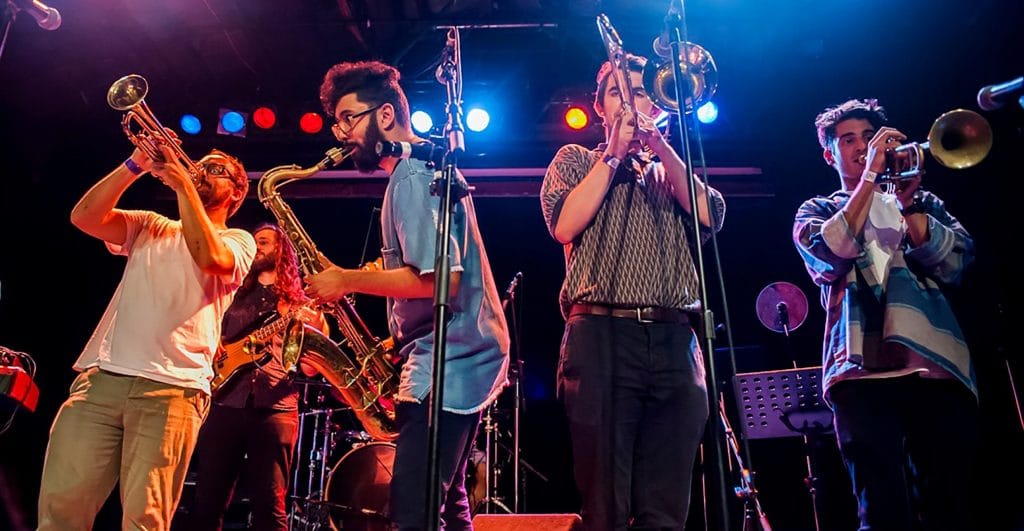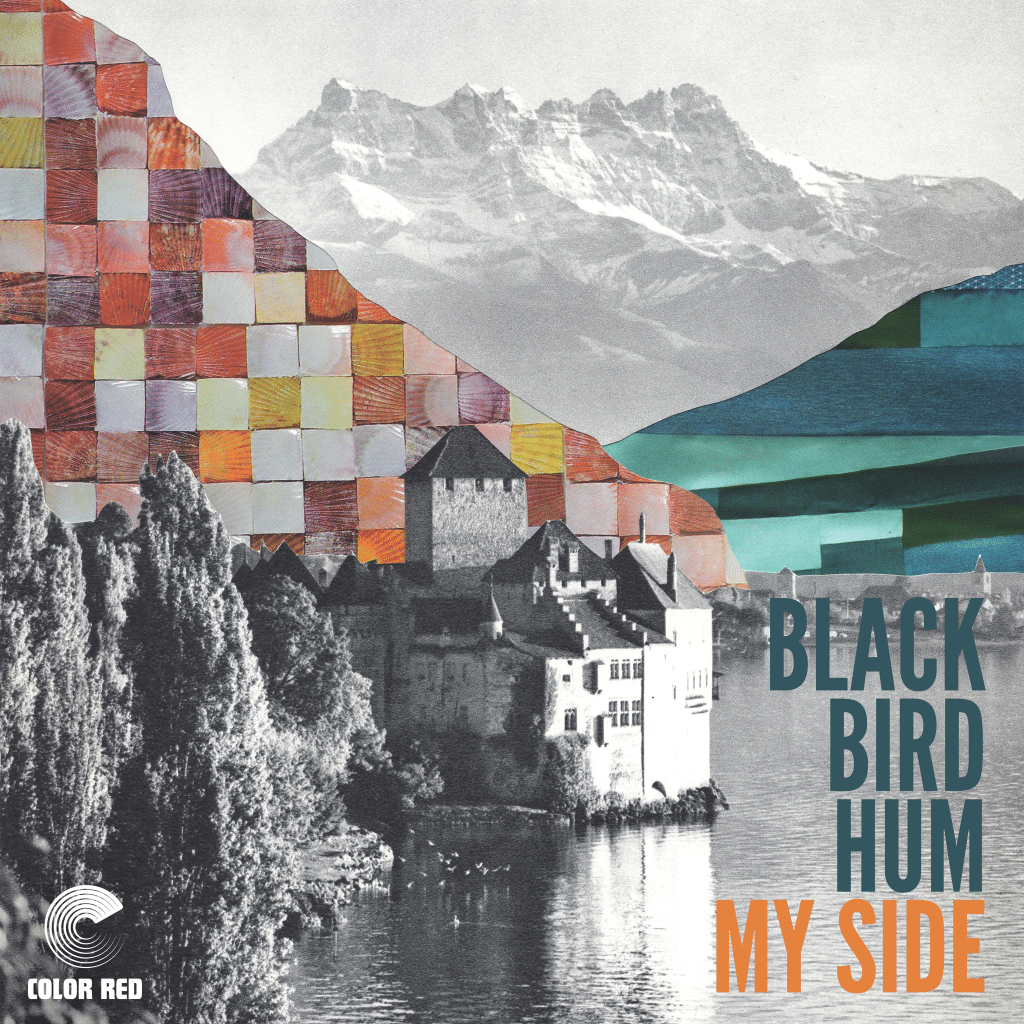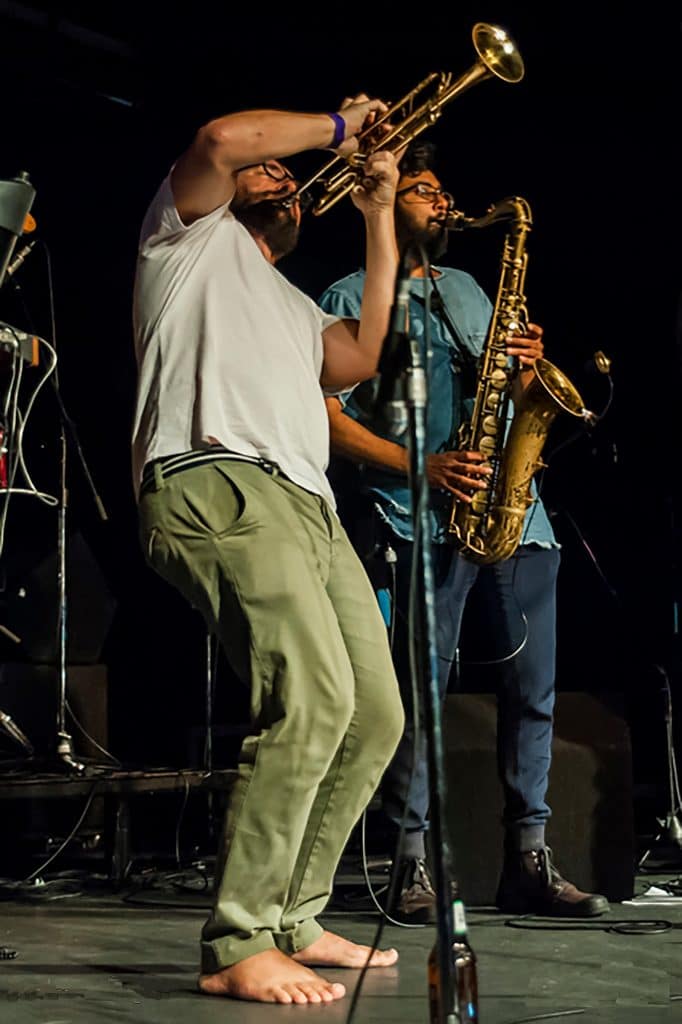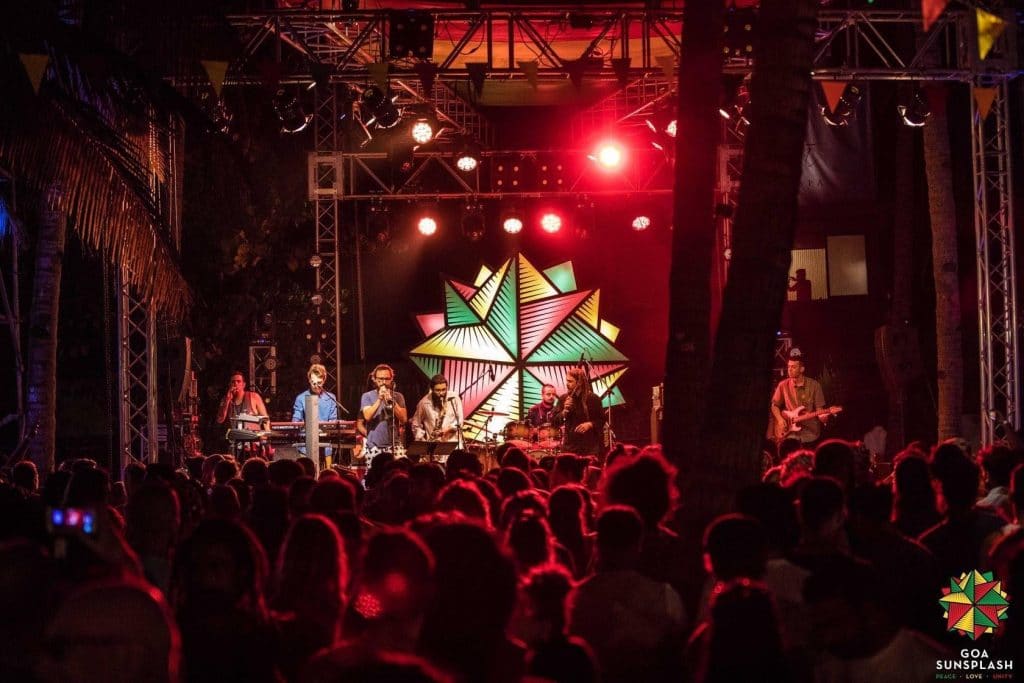Color Red is one of the most exciting things happening in the music industry right now. Part record label, part media/streaming platform and part distribution network, the international cooperative was founded by Eddie Roberts, guitarist for soul/jazz/funk extraordinaires, The New Mastersounds. Based in Denver with outposts in Japan and Madrid, in addition to Roberts, the majority of its industry-leading team of producers, entrepreneurs and media directors are professional musicians in their own right.
“Color Red truly is a musical family,” says Leah Concialdi, Director of PR and Communications. “The core philosophy of the platform is to ensure fair compensation to all collaborators from dollar one. The majority of our team is musicians and we’ve been through the rigmarole of unfair contracts and lack of transparency, so we pride ourselves in offering an equal playing field.”
Concialdi, who plays saxophone for ATOMGA, a Denver-based Afrobeat group, voices how Color Red aspires to become a brand name that fans can rely on for blue-ribbon music. “It’s an artist-driven platform for collaboration and the production of independent art. We invest our time and resources into artists who are creating quality, original music and that takes precedent. If you think back to labels like Blue Note, you may not recognize the artist, but between that Blue Note logo and the branding of their records, you are prone to pick it up because you know it’s curated, you know it’s going to be good, and you know it fits a vibe.”
Beyond facilitating the production of the music, Color Red provides supplementary content to provide listeners with deeper insight into each project, which is what makes Color Red more of a platform than simply a label. “With every track release, you can find it on our playlist, you will see animated art tracks, you will get dedicated track emails to your inbox,” Concialdi points out.
Other unique ideas that Color Red offers include a weekly internet radio show (available through podcast platforms as well) showcasing their music, a vinyl subscription club which delivers rare, out-of-print records personally curated by Roberts on a quarterly basis, and a weekly remix series utilizing the talents of producers/DJs around the world.
In a little over 2 years of existence, in addition to the previously mentioned accomplishments, Color Red has released over 135 digital singles, raised over $30k in micro-grant funds in partnership with Eddie Roberts’ Payback (an Emergency Relief Fund in support of musicians facing economic hardships as a result of the Covid-19 pandemic) and launched Color Red Japan, where they are currently running a contest to find the best talent nationwide to showcase on the platform.
“We are quite proud of all we’ve accomplished, especially in the middle of a pandemic,” she beams. “Not just to big up ourselves, but to give artists the platform to release and showcase their music.”
This month, Color Red features tracks from artists from four different countries, including Nigeria, Germany, the Democratic Republic of Congo and Australia. The last of which, a single by Sydney reggae band black bird hum premiering here today, particularly excites Concialdi.
“The back bird hum release is very special not only for the platform, but for me personally,” she says. “They are the first artist we’ve worked with in Australia, and their drummer, Jeff Reiss, is the former drummer of my afrobeat project ATOMGA (who Rootfire has featured.) The big picture here is that our platform is all about collaboration and bringing in fellow artists to our network and Color Red family.”
The song, titled “My Side,” drops tomorrow along with a b-side dub version, two heavenly downtempo roots reggae tracks that would be equally appropriate on the Rootfire Progressive Roots playlist as on a Hotel Costes lounge music compilation. Dreamy vocals from Little Green wash over you like a warm bath, while the effervescent notes of a flute conjure healing vibes. Make no mistake, however, the catchy chorus of “Everything I did that I did was wrong” has enough swing in it to get the foot tappin’ and shoulders bobbin’. black bird hum executes this wonderful composition to sublime perfection, through a tune that eases the soul while arousing the libido. This is hands down one of the best reggae singles of 2020.
It takes special talent to make music this good, so Rootfire connected with black bird hum bandleader, Jon Panic, to learn a little bit more about the group and their background.
Artwork: Collage The World
RF: Can you speak to the origin of the name of the band?
JP: The band name was the result of a pretty intense “fever dream” that lasted quite a few hours and was dominated by a crow. It’s hard to explain how much crow, without saying “everything was crow.” I’ve not found another use of the English language that does the experience justice.
It felt significant, at least for a few days.
And it was right about the time I’d started working on the first few songs that would become the bbh project. So I thought why not reference the crow in the title.
RF: The band description on the Facebook page refers to bbh as a “supergroup.” From what other bands (besides ATOMGA) did bbh members come from and what brought everyone together?
JP: The Sydney music scene is ridiculously incestuous, so we all play in other bands. Everyone seems to be in at least one other group, if not three or four. We have members in a psychedelic rock band called Thunderfox, a prog jazz group called Arcing Wires, an afro/funk band called Lyre Byrdland, a ska covers band called Monkey Spanner, and a bunch of the band have their own projects. Freyja, our keys player has a mad jazz septet.
Amy, who sings for us, performs solo as Little Green. On top of that, the band have dipped in most of the reggae bands going around the city – The Strides, Revolution Inc. and a bunch more.
I feel really lucky to keep finding myself on stage, and in the studio with this bunch. Good humans.
RF: Is there a collective most prominent influence(s) or are there too many musicians in the band to make that statement?
JP: We’ve had 11 or 12 in the tour bus at our most packed, so yeah I think it’s too hard to point to a single influence. On any given night you’ll hear so many different references in our performances.
Saying that, in the song writing I think we definitely lean heavily on the likes of Roots Radics, Sly and Robbie, Scientist, the Upsetters and Burning Spear for the inspiration for our grooves. That tends to be where we find the most joy when we’re all in our drummer Jeff’s lounge room starting something from scratch. Simple, heavy, bass-driven grooves. No-nonsense stuff that feels really good to play for a really long time.
The melodies that go on top are probably more of a mixed bag. I think there’s a bit of folk, and even punk, hiding in the vocal melodies. And there’s a whole lot of jazz and blues in the horn lines and piano melodies.
RF: One of my favorite things about reggae music is the international community that embraces it so I was hoping you could give RF readers some insight into the local scene. I’m familiar with Australian artists like Nattali Rize (and her former band, Blue King Brown) and The Beautiful Girls as well as New Zealand artists like Fat Freddy’s Drop, The Black Seeds and Salmonella Dub. What kind of connection is there between the Australian and New Zealand reggae communities? Are they one in the same, or two distinct scenes, or somewhere in the middle? Does the local scene trace back to the days of the foundational artists? To what extent would you say it has ties to the surfing community?
JP: We have a great reggae scene in Australia. And there’s definitely some cross over with New Zealand – a couple of Kiwi acts have based themselves out here – Manalion and Sub Tribe, and there’s also huge numbers of Kiwis living over here that are really supportive of all the reggae bands around. We opened for Six60 on one of their tours here and it was pretty much all New Zealanders in the audience. It was a great night (“Kia ora” to Kiwi fam!)
Artists like Nattali Rize and TBG’s have definitely led the way on the international front in the last 10-15 years, and Melbourne Ska Orchestra too, who we’ve had some awesome gigs with. But before them, and before my time, there were a few other artists, like No Fixed Address who were an Aboriginal Australian reggae band who did really well in the late 70’s and 80’s.
There’s probably a bit of a link to the surfing community, but I feel like that’s more about the location of the venues that support reggae music here. When we tour, it’s almost always along the coast. In all the major cities and coastal regional centres here, you seem to have a pub that either has a reggae night or will draw a good crowd if you put a reggae band on.
RF: On the band’s web page, I noticed this recent blog post:
June 05, 2020
Yesterday a bunch of us marched on Sydney alongside First Nation’s people protesting police brutality and institutionalized racism in Australia.
Based on this post, it seems as though Australia has an issue with police brutality and racism similar to that in America. Here, thankfully, plenty of people have galvanized to voice their disdain for injustice and call for change, yet unfortunately too many people do not recognize or won’t admit there is a problem and it waters down the power of the people. Exacerbating the issue, we have a population of hardline government supporters that side with the police and act aggressively toward the protestors, inflaming the confrontations with even more animosity and violence.
Would you say that the situation is similar in Australia, or would you say that the people are more, or perhaps less, unified than in the U.S.A.?
JP: I live and make music on the land of the Cannalgal and Kayimai people.
In Australia, the impact of systemic racism is undeniably brutal. There have been 432 Aboriginal deaths in custody since 1991. No one has been held to account for any of these deaths. First Nation’s people in Australia make up about 3% of the population but 29% of the prison population. It’s so obviously systemic and wrong.
And like in the US, the reflex of the State seems to be to fight against the protests rather than engage with what they’re about. There’s no genuine political will from the major party governments to address the issues. That day of the march you mentioned, the police had taken the organisers (Warriors of the Aboriginal Resistance) to the Supreme Court to have it shut down. From memory, the Supreme Court ruling was only overturned an hour or two before we got on the streets. So yeah, that’s the mood here, it’s not “We’ve got this wrong, let’s work together to fix it.” For a lot of people, it’s “This is an inconvenience. Get out of the way.”
RF: Reggae music has long standing roots as protest music. Does bbh music embody this call for social justice, or are the lyrical themes more personal or abstract?
JP: We do sometimes use music as a way to shout and complain about things we’re concerned or angry about or processing. Writing is always good for that.
We probably have a pretty even split between songs that are about issues we care about and songs that are about relationships and more personal themes. This latest release fits in the relationship bucket, but a couple of our more recent tracks were examples of us getting angry and frustrated at the world around us.
“All Hail the Market,” the last single we released, was a kind of mock-prayer to the gods of capitalism and how we all end up behaving at this point in the evolution of capitalism.
“Down,” which was a couple of tracks before that, was someone seeing everything wrong with the world, but from a position where they were largely unaffected and privileged and knowing they could make a difference but taking the easy way out.
RF: What’s on tap next for bbh after this single?
JP: We have tried to keep writing through the pandemic. It was hard at times and all done remotely, but we’ve stuck at it and been pushing each other to keep finding time to collaborate. We’ve just started getting back into Jeff’s lounge room again now that lockdown has eased, and the rhythm section are meeting regularly to work through some of the new tracks that are almost done.
It’d be nice to gig as we find our tracks evolve a lot on stage and always for the better, but that’s probably a little way away.
So yeah, write more, release the next ones as soon as they’re ready, and then hopefully sneak onto some stages sooner than later.




